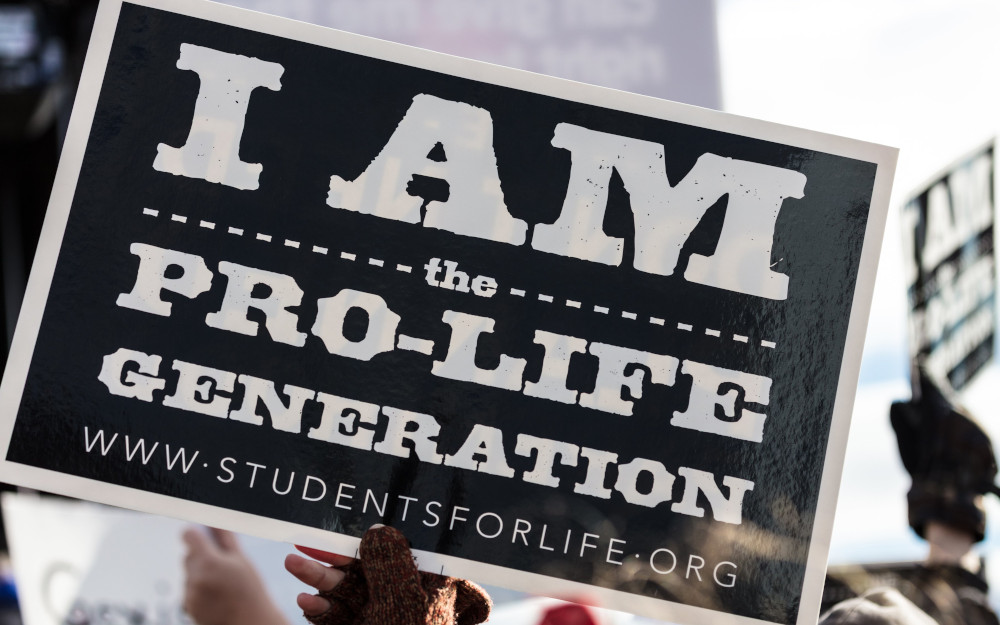
A sign held during the 2017 March for Life in Washington. (Creative Commons/James McNellis)
The presidential election is shaping up to be a tough one for those who see it literally as a matter of life and death.
The Democrats running for the White House all vow to take action on gun violence and police misconduct, health care, the environment and abolishing the death penalty. At the same time they consider the idea of an anti-abortion progressive an absurdity.
In New Hampshire Feb. 9, the front-runner for the Democratic nomination, Bernie Sanders, said that "being pro-choice is an absolutely essential part of being a Democrat" and vowed to nominate judges who would be 100% behind Roe v. Wade. One of his goals, he said, is to "codify" Roe into law and expand Planned Parenthood.
A few days earlier, Pete Buttigieg, pressed by Kristen Day, executive director of Democrats for Life, on whether the party might moderate its language to welcome folks who want to reduce the number of abortions, answered bluntly, "I'm not going to try to earn your vote by tricking you. I am pro-choice, and I believe that a woman ought to be able to make that decision."
Meanwhile the Republican Party, which calls itself pro-life, has become an obstacle to life on any issue but abortion. Its current leader, Donald Trump, has become best known for putting children in cages or letting them die in detention while apart from their parents. His social welfare policies have put the more than 140 million Americans who live in poverty at risk.
But purely from a political viewpoint, it's the Democrats who are the bigger puzzle. They seem to be doing everything they can to lose independent voters (like me) and Republican refugees — those voters Buttigieg calls "future former Republicans," not to mention the 29% of Democrats — some 20 million people by some estimates —who call themselves pro-life. (Another 59% support at least some restrictions on abortion, according to Gallup.)
It's little wonder that the Democratic candidate that was surging over the weekend, Minnesota Sen. Amy Klobuchar, made headlines by taking a different angle. "I am strongly pro-choice," she said. "I have always been pro-choice. But I believe we're a big-tent party, and there are pro-life Democrats, and they are part of our party. I think we need to build a big tent. We need to bring people in instead of shutting them out."
Not so long ago, "big tent" language on abortion was the official Democratic Party line. The platform of the Democratic National Committee said that abortion should be "legal, safe, and rare" and that we should all be working together to make it rarer and rarer. In my home state of Pennsylvania — one of the swing states that went for Trump in 2016 — this kind of rhetoric still draws voters, as Pennsylvania's Sen. Bob Casey, who has won on a pro-life platform, can attest.
Pro-life voters are not just white evangelicals but a diverse demographic slice of the American population. Abortion weighs heavily on how many Catholics, Latinx, African American and Asian Christians as well as Jewish and Muslim voters decide on a candidate. And even in their advocacy for life, they are moderates: Many pro-lifers do not want to overturn Roe v. Wade but want to see the number of abortions reduced, in part by providing adequate healthcare and other services to people facing the somber decision.
Advertisement
We don't hear about this in part because of the partisan dualism of pro-choice versus pro-life. Trump is better than perhaps any other recent president at exploiting single-issue voters, convincing them that his appointment of federal judges is enough reason to turn a blind eye to everything else he does.
Religious pundits like Franklin Graham and Robert Jeffress abet him by hailing Trump as the most pro-life president in American history, even as he assassinates a foreign leader days before speaking at the March for Life and celebrates countries like China who execute citizens for drug offenses just a day after speaking at the National Prayer Breakfast.
Liberals and conservatives who care about life need to overcome the politicization of life issues to find common ground. All of us who are pro-life should continue to care about abortion, but we should care just as passionately about all the other issues that are destroying the lives and squashing the dignity of children whom God created and loves so deeply. It's not enough to make the womb a safe place if the child is in deeper trouble as soon as it is born.
Wouldn't it be beautiful to have a pro-life movement that worked to reduce abortions but also stood just as passionately against the death penalty, gun violence, militarism and war, the degradation of creation, police brutality and all other things that destroy life? That would truly be a pro-life movement. To be pro-life is not only about protecting the unborn but also about supporting folks after they are born.
All Americans who have compassion for mothers, who fight for health care and preserve the right to terminate a pregnancy should consider the power of the consistent ethic of life, which has been a helpful ethical framework for centuries, and help to make abortion something that happens in extreme, exceptional conditions.
One of the most important questions for this election is: Can we have a better conversation about abortion? We are tired of death. We also are tired of a two-party system that is very inconsistent when it comes to this ethic of life. It creates a quagmire for all of us for whom life is our ultimate value.




